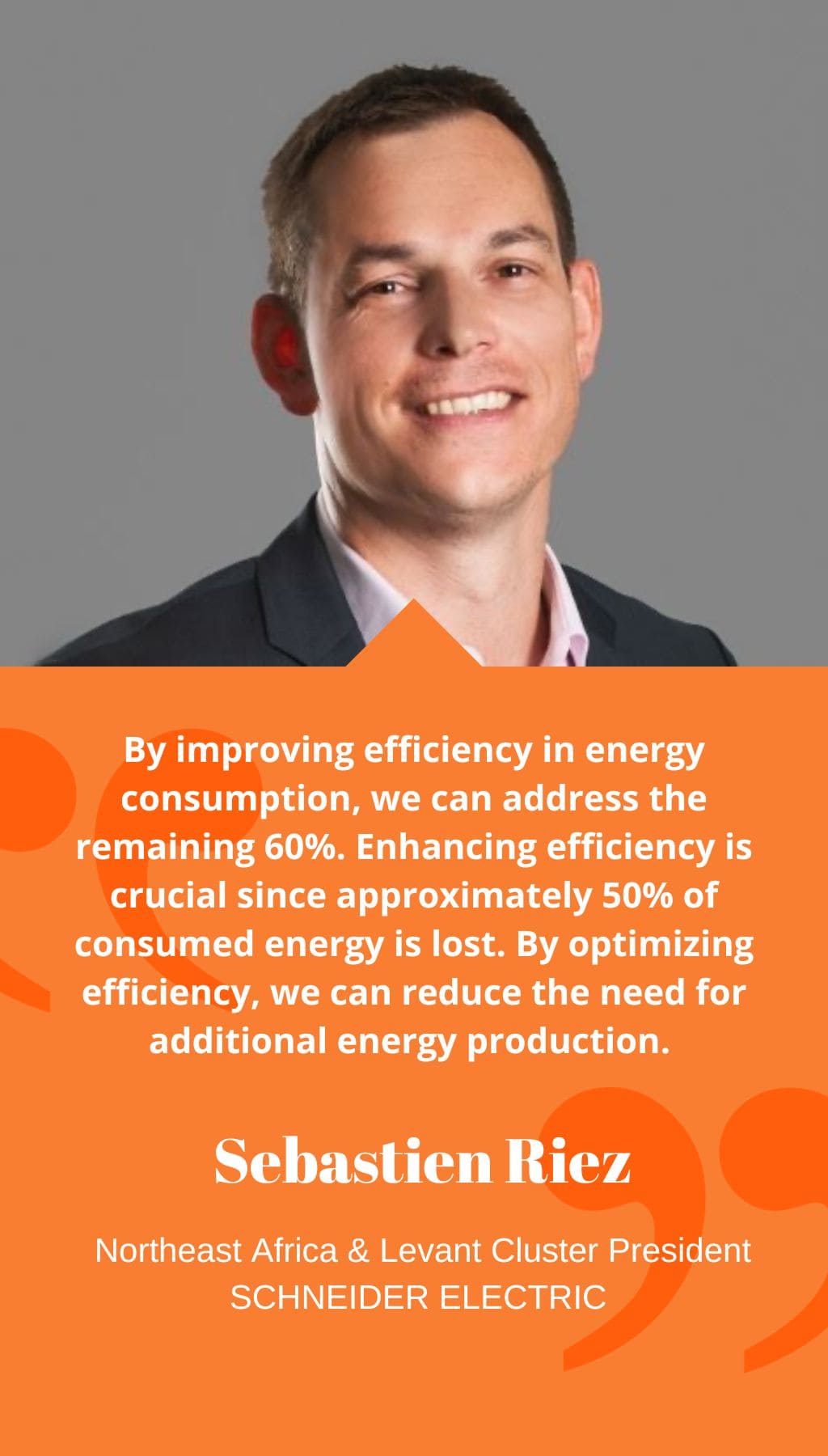
- Egypt | 15 March 2022

Can you provide an overview of Schneider Electric’s history in Egypt and its main operations and activities?
Schneider Electric is a global specialist in the digital transformation of energy management and automation, operating in more than 100 countries worldwide. In the Northeast and Levant Cluster, which includes eight countries, Egypt stands out as the leading country. We have been present in Egypt for 35 years and have made significant investments, totaling over €300 million. Our operations in Egypt employ more than 1,500 people, serving not only Egypt but also the entire cluster. We have a comprehensive ecosystem in place, with our head office managing commercial operations for the cluster and a factory that supports the country, cluster, and region. We export products from the Badr Factory, specifically electricity distribution panels, to 14 countries in the Middle East and Africa. Additionally, we have distribution and engineering centers. Recently, we invested €10 million to add a new production line in the Badr factory, expanding our production capacity.
What sets Egypt apart from the other areas in the cluster?
Egypt holds a prominent position within the cluster of eight countries we manage and is one of the leading countries in the Middle East and Africa for Schneider Electric. The size of the country and our extensive presence in Egypt reinforce its status, despite some past challenges. With a population of nearly 120 million people, Egypt’s purchasing power continues to grow, making it a significant market within the region.
What competitive advantages does Schneider Electric have in the market?
One of our key competitive advantages is our ability to attract talented and loyal individuals to our company. We strive to retain these talented employees and provide them with opportunities for growth and advancement within the group. Notably, around 100 Egyptian talents have relocated to the Middle East and Africa zone and the group in the past 18 months, highlighting the caliber and skills of Egyptian professionals. Our long-standing presence in Egypt and our portfolio of strategic projects with partners have also contributed to establishing a strong local presence at a high level. This sets us apart from our competitors, as we position ourselves as a global local company, combining global expertise with a deep understanding of the local market. For instance, we are actively engaged in strategic projects such as water treatment and desalination plants in Alamien and New Delta, which are part of Egypt’s priority strategies. Additionally, we are involved in the digitalization of the country’s electrical distribution network, one of the largest projects for Schneider Electric worldwide. Our participation in various critical projects, including transportation and energy and chemicals, further strengthens our position.
How do you help companies achieve the energy transition in the oil and gas sector?
The oil and gas sector is significant for us, even though we have been recognized as one of the most sustainable companies by Corporate Knights. To drive decarbonization efforts, we focus on the segment with the highest level of emissions, which happens to be the oil and gas sector. We assist companies in this sector, as well as other industries, in becoming more efficient, saving costs, and reducing their carbon footprints. While most attention is typically given to the supply side of energy transition, accounting for only 40% of the equation, we emphasize the demand side. By improving efficiency in energy consumption, we can address the remaining 60%. Enhancing efficiency is crucial since approximately 50% of consumed energy is lost. By optimizing efficiency, we can reduce the need for additional energy production. Our sustainability efforts go beyond the supply side, focusing on making long-term improvements in consumption efficiency.
What challenges are you facing with the energy transition in Egypt?
Schneider Electric serves as the digital partner for sustainability and energy efficiency, assisting our customers in achieving their goals. Efficiency plays a vital role in lowering emissions and promoting sustainability. Depending on the characteristics of a country, different aspects may come to the forefront. Previously, the focus on sustainability was more prevalent in the US and Europe, driven by environmental concerns. However, with economic uncertainties, there is now a greater emphasis on cost savings. The advantage of efficiency is that it addresses both aspects simultaneously. I take pride in working for a company where doing business translates into environmental benefits.
What are Schneider Electric’s short- and long-term priorities for Egypt?
Our immediate priority is for Schneider Electric to become the trusted advisor for its customers in terms of efficiency and sustainability. We have achieved significant milestones, particularly with our participation in COP27, where we worked on various initiatives and engaged in high-level meetings with ambassadors, the Ministry of Environment, and the Ministry of Transport. During COP27, we welcomed 10 ministers from Egypt and other countries to our Sustainability Hub, aiming to make a real impact. We linked the UN’s Sustainable Development Goals (SDGs) with Schneider Sustainability Impact’s long-term commitments and showcased concrete solutions and projects at our Schneider Electric Sustainability Hub. For example, we demonstrated how building owners equipped with Schneider Electric solutions could achieve improved efficiency and comfort simultaneously. In the energy and chemicals sector, our software allows monitoring of CO2 emissions and the ability to adjust processes to reduce emissions based on specific needs. Schneider Electric has received industry recognition for implementing concrete solutions with our customers. Our focus now is on emerging countries within the cluster, which offer untapped potential. We plan to accelerate our efforts, leveraging our setup in Egypt, which includes our team, factory, and eventually a distribution center. Egypt will serve as the center for addressing business in these countries. While we will maintain teams in Iraq, Malta, and other countries, having direct operations in Egypt will support the growth of our export business. This aligns with the top priorities of both the government and Schneider Electric.














